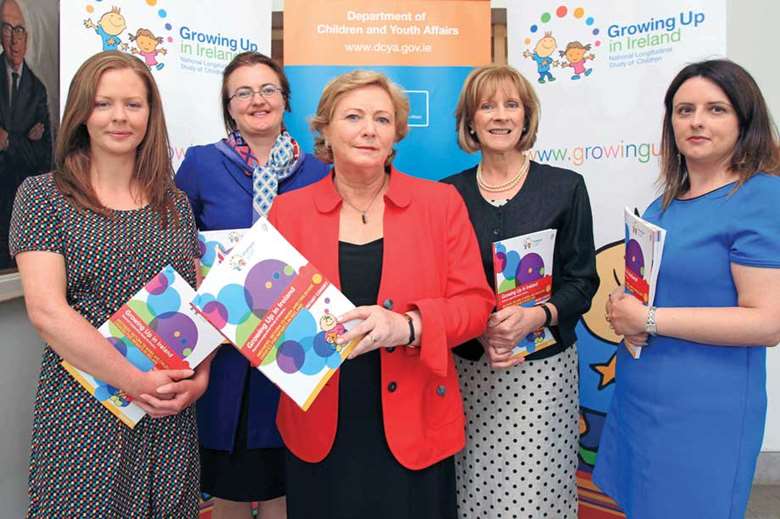Study finds that many in Irish childcare sector have no qualifications
Katy Morton
Friday, July 26, 2013
New research has revealed that many of those caring for children in the country, particularly relatives, do not have childcare-related qualifications.

The latest report from Growing up in Ireland, the national longitudinal study of children, funded by the government, which will follow a group of nine-year-old children and a group of nine month olds over a period of seven years, focuses on childcare choices and mothers' return to work. The findings are based on interviews with more than 11,000 families of nine-month-olds and survey responses of those providing childcare.
The report shows that more than 50 per cent of home-based carers, mainly childminders, do not hold related qualifications, and only one in five nursery employees have Level 3 or HETAC, a nationally recognised childcare qualification.
Currently, pre-school settings in Ireland are required to have a minimum of 50 per cent of staff with a qualification appropriate to the care and development of children under the Childcare Regulations (Pre-School Services) 2006.
The Early Childhood Care and Education scheme, covering Ireland's free pre-school year, also states that the play leader in each room of a setting must have a minimum of a FETAC Level 5 Certificate in Childcare.
But there are no minimum requirements for childminders, who are only required to register with the Health Service Executive if caring for more than three pre-school children.
While the Irish Government announced last month that it plans to develop the workforce and bring in a minimum qualification for those who work with children, this will not apply to childminders.
Ireland’s children’s minister Frances Fitzgerald told Nursery World in June that all practitioners will be required to have the minimum of a FETAC Level 5. On completion of a Level 5 student can apply to do a degree.
Childminding Ireland, a national organisation that promotes and supports quality home-based childcare, has called for an immediate re-think by the Government about how childminding is supported nationally, and for childminders to hold a current certification in first aid and a minimum standard of training for new childminders.
A chapter in the report shows that at nine months, just under 40 per cent of the children were in regular non-parental childcare.
Of these, 42 per cent were cared for by relatives, 31 per cent by non-relatives, including childminders, and 27 per cent in centre-based care such as nurseries and creches.
Low-income, low-educated families and young mothers most commonly used relatives to provide childcare. The authors suggest that the high cost of childcare in Ireland is the main reason for this.
The report also shows that children in nurseries and crèches receive less one-to-one interactions compared to those being cared for by childminders or relatives.
The report shows that a low proportion of the mothers started work in their child's first four months, and by five months old just 8 per cent were working.
A rapid increase in the number of women returning to work after childbirth occurred at six months, which coincides with the end of paid maternity leave in Ireland.
Compared to mothers in couples, lone parents were more likely to be in employment at four, five and six months after their child's birth.
By the time their child was nine months old, 44 per cent of mothers were back at work.
Mothers with degrees were most likely to return to work after nine months, perhaps because they had the financial resources to take unpaid leave after their maternity pay ended.
Employment rates of mothers of two or more children were slightly higher in the first five months of their youngest child’s birth.
At nine months, mothers of three or more children were much less likely to be working (31 per cent) than mothers with one child (50 per cent).
Childcare and health
Researchers also analysed children’s health outcomes associated with different childcare settings and found that at the age of nine months children in centre-based care, such as nurseries and crèches, had a higher risk of infections than those being cared for by their parents.
Children in daycare were two and half times more likely to have had a chest infection and over twice as likely to have had an ear infection.
The authors claim that the higher risk associated with centre-based care could arise from the greater number of children that nine-month-olds came into contact with at the setting.
The Irish minister for children and youth affairs Frances Fitzgerald said, 'The report sheds light on key issues relating to mothers' return to work and the care of infants. The findings provide a valuable backdrop to ongoing policy discussions relating to early childhood services and matters of cost, choice and quality of childcare, including the context of the ongoing work on Ireland's first ever Early Years Strategy.'
Dr Frances McGinnity, an author of the report and senior researcher at the Economic and Social Research Institute, said, ‘It is clear that there is considerable potential in the data from Growing up in Ireland to enhance our understanding of the use and impact of non-parental childcare for young children in Ireland.
‘Over a period of three years we will examine how the families’ childcare choices are related to the children’s developmental outcomes.’




